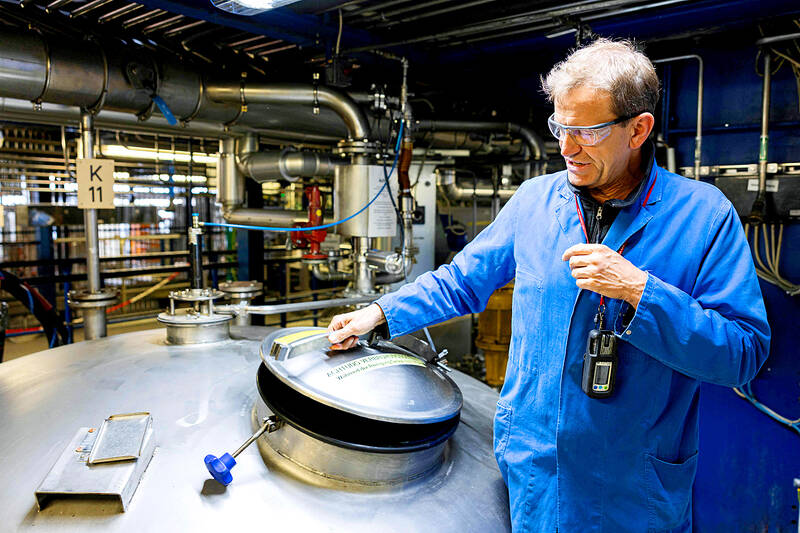In the laboratories of German fragrance and flavors giant Symrise, a citrus scent clings to the lab coats of trainees — “noses” who are learning the art of making things smell good.
These busy heroes of the world of smells and aromas shape the connection millions of consumers have with everyday items.
While at high-end perfume labels, olfactory artists create scents for luxury body sprays, Symrise’s experts work on everyday products that might range from mint-flavored toothpaste to barbecue chips.

Photo: AFP
Smell, a powerful sense that can trigger emotions and memories, and aroma often decide which food or beverage, cleaning or personal hygiene product ends up in the shopping cart.
At Symrise’s headquarters in Holzminden, a quiet town south of Hanover, each day at the company’s in-house perfumery school begins the same way: sniffing out scents from dozens of tiny bottles while blindfolded.
“It’s just like tuning a musical instrument before you play,” said Alicia De Benito Cassado, a 32-year-old former professional pianist from Spain.

Photo: AFP
Her career switch into scent development was a natural step: she made her own perfumes as a teenager to match the poetry and music that she wrote.
“For me, not everything has to smell good,” she said. “The horror of smell also helps us discover ourselves.”
But commercial clients demand something different, De Benito Cassado added.

Photo: AFP
“In the end, we need to create scents that are strong, beautiful, powerful — and affordable.”
PROFESSIONAL SNIFFERS
Being a “nose” is a full-time job and comes with a three-year training program. The smell of a fabric softener can be composed of 80 compounds, far more than in a premium body perfume, and the best noses can make out over 1,000 different odors while blindfolded.

Photo: AFP
Shangyun Lyu, 31, came from China to study at the school and says that a professional sniffer can get by with knowing about 500 scents. Being able to break down odors into their chemical components is key.
“As a kid, I just smelled jasmine or gardenia as flowers,” he said. “Now, I recognize the chemicals: it’s a blend of many elements.”
Students weigh ingredients down to the milligram, mix, smell and start over, often by replicating existing smells to understand their structure and then innovate from there.
“When developing perfume, it is very important that several people smell it,” said 56-year-old master perfumer Marc vom Ende, head of the school. “We all perceive smell differently.”
‘NOSE HAS THE FINAL SAY’
Pleasant smells cannot come at any cost, and the rules of the game change over time. Lilial, a chemical once prized for its floral and sweet Lily-of-the-Valley notes, has been banned in the European Union since 2022 over fears it can cause skin irritation and damage the reproductive system.
Fragrances applied directly to the body have stricter regulations than detergents, said 27-year-old South African trainee Attiya Setai.
“We’re more restricted in raw materials and must replace banned ingredients with new compliant ones,” she said.
Tastes also vary across global markets, with Shangyun pointing to the example of Chinese shampoos that sell well with a young clientele there but would struggle in Europe.
“Something old-fashioned in one country can be new elsewhere,” he said.
Cost also enters the equation. Symrise extracts aromatic compounds from wood resin, a by-product of the paper industry, in a move “that makes both economic and environmental sense,” said vom Ende.
It is hard to be a nose. About 500 perfumers work in the industry and 80 of them at Symrise, which has a workforce of 13,000. The company markets about 30,000 products to clients ranging from confectioners to pet food manufacturers and suncream makers.
Symrise’s competitors include DSM-Firmenich, headquartered in both Switzerland and the Netherlands, as well as Givaudan, another Swiss firm.
Artificial intelligence increasingly plays a role, with computer program predicting which fragrances will hit the mark.
Still, the machines cannot — yet — smell, even if they can understand speech and read text.
“We’re supported by AI,” vom Ende said. “But the nose has the final say.”

The Directorate-General of Budget, Accounting and Statistics (DGBAS) told legislators last week that because the Chinese Nationalist Party (KMT) and Taiwan People’s Party (TPP) are continuing to block next year’s budget from passing, the nation could lose 1.5 percent of its GDP growth next year. According to the DGBAS report, officials presented to the legislature, the 2026 budget proposal includes NT$299.2 billion in funding for new projects and funding increases for various government functions. This funding only becomes available when the legislature approves it. The DGBAS estimates that every NT$10 billion in government money not spent shaves 0.05 percent off

Dec. 29 to Jan. 4 Like the Taoist Baode Temple (保德宮) featured in last week’s column, there’s little at first glance to suggest that Taipei’s Independence Presbyterian Church in Xinbeitou (自立長老會新北投教會) has Indigenous roots. One hint is a small sign on the facade reading “Ketagalan Presbyterian Mission Association” — Ketagalan being an collective term for the Pingpu (plains Indigenous) groups who once inhabited much of northern Taiwan. Inside, a display on the back wall introduces the congregation’s founder Pan Shui-tu (潘水土), a member of the Pingpu settlement of Kipatauw, and provides information about the Ketagalan and their early involvement with Christianity. Most

The People’s Republic of China (PRC) was out in force in the Taiwan Strait this week, threatening Taiwan with live-fire exercises, aircraft incursions and tedious claims to ownership. The reaction to the PRC’s blockade and decapitation strike exercises offer numerous lessons, if only we are willing to be taught. Reading the commentary on PRC behavior is like reading Bible interpretation across a range of Christian denominations: the text is recast to mean what the interpreter wants it to mean. Many PRC believers contended that the drills, obviously scheduled in advance, were aimed at the recent arms offer to Taiwan by the

It is a soulful folk song, filled with feeling and history: A love-stricken young man tells God about his hopes and dreams of happiness. Generations of Uighurs, the Turkic ethnic minority in China’s Xinjiang region, have played it at parties and weddings. But today, if they download it, play it or share it online, they risk ending up in prison. Besh pede, a popular Uighur folk ballad, is among dozens of Uighur-language songs that have been deemed “problematic” by Xinjiang authorities, according to a recording of a meeting held by police and other local officials in the historic city of Kashgar in